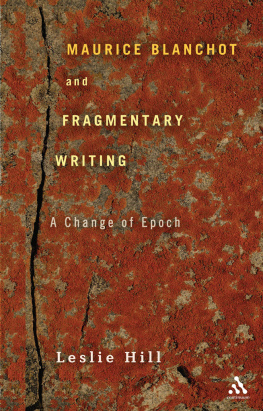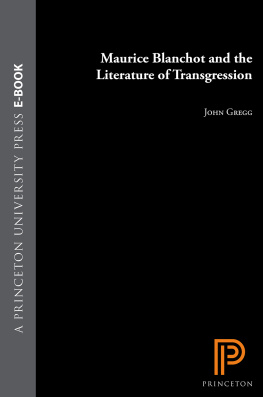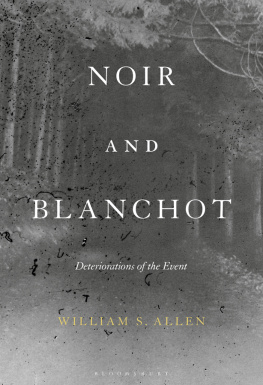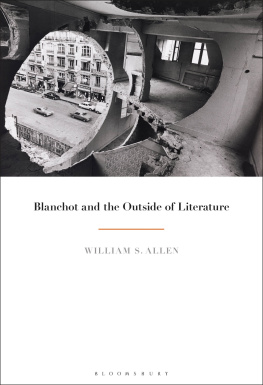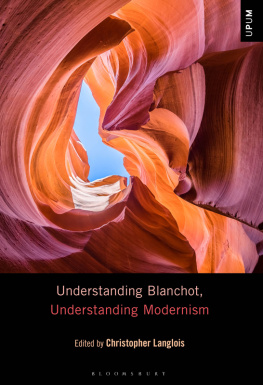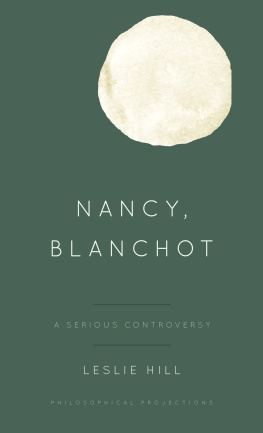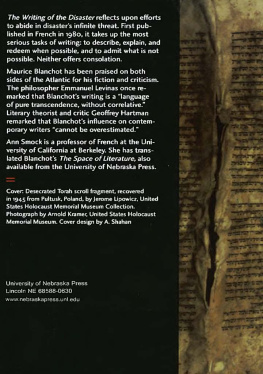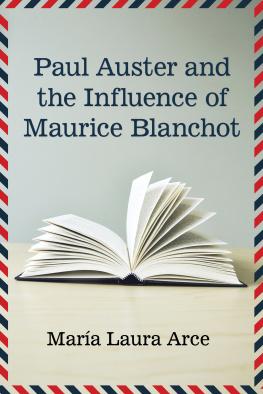CONTENTS
Guide
MAURICE BLANCHOT
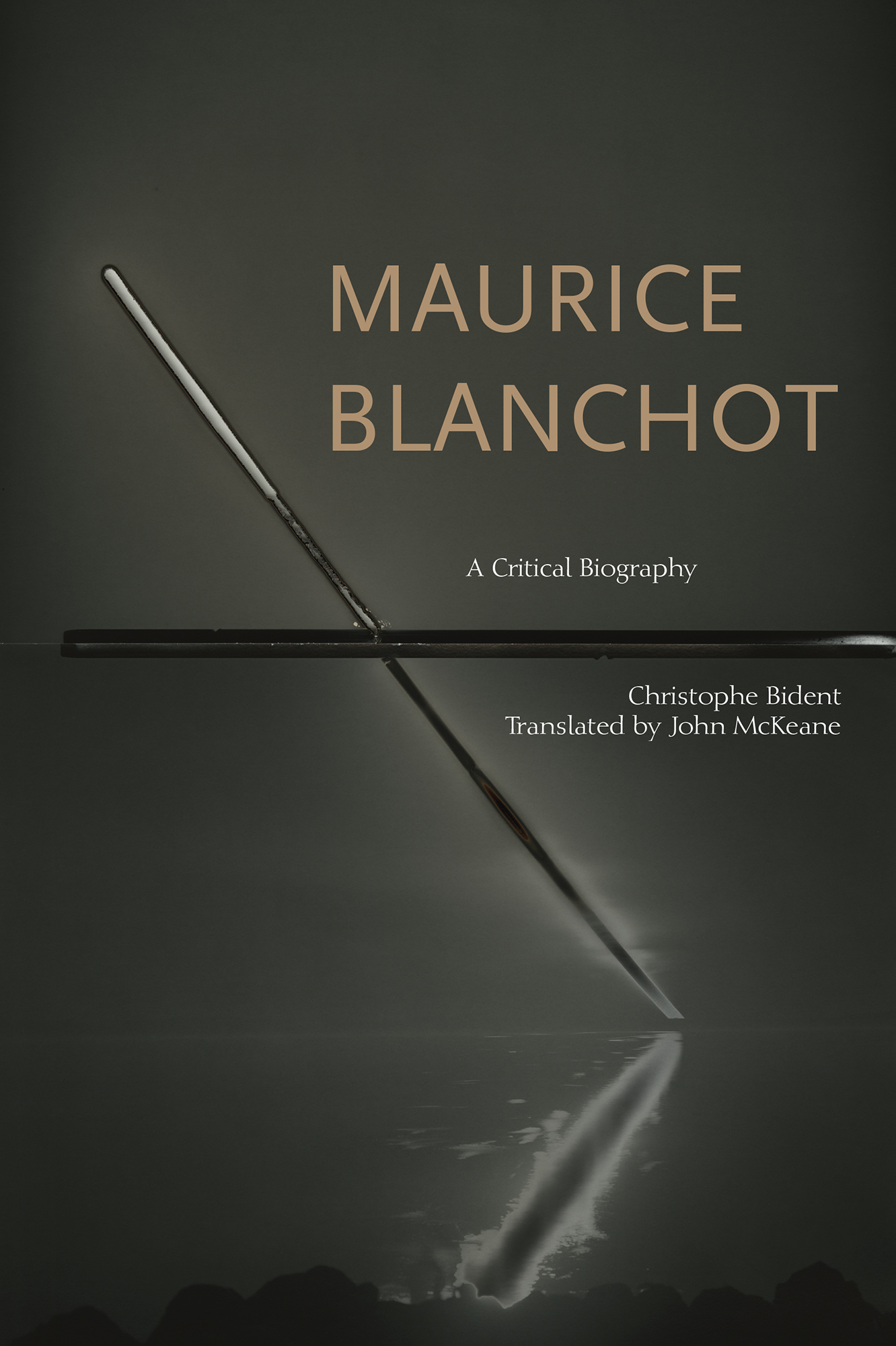
Maurice Blanchot
A CRITICAL BIOGRAPHY
CHRISTOPHE BIDENT
Translated by John McKeane
FORDHAM UNIVERSITY PRESS
New York 2019
Copyright 2019 Fordham University Press
All rights reserved. No part of this publication may be reproduced, stored in a retrieval system, or transmitted in any form or by any meanselectronic, mechanical, photocopy, recording, or any otherexcept for brief quotations in printed reviews, without the prior permission of the publisher.
This book was originally published in French as Christophe Bident, Maurice Blanchot: Partenaire invisible; Essai biographique,
Copyright 1998, ditions Champ Vallon.
Cet ouvrage, publi dans le cadre du programme daide la publication, bnficie du soutien du Ministre des Affaires Etrangres et du Service
Culturel de lAmbassade de France reprsent aux tats-Unis.
This work received support from the French Ministry of Foreign Affairs and the Cultural Services of the French Embassy in the United States through their publishing assistance program.
Fordham University Press gratefully acknowledges financial assistance and support provided for the publication of this book by the University of Reading and by the Centre de recherches en Arts et Esthtique, Universit de Picardie Jules Verne.
Fordham University Press has no responsibility for the persistence or accuracy of URLs for external or third-party Internet websites referred to in this publication and does not guarantee that any content on such websites is, or will remain, accurate or appropriate.
Fordham University Press also publishes its books in a variety of electronic formats. Some content that appears in print may not be available in electronic books.
Visit us online at www.fordhampress.com.
Library of Congress Cataloging-in-Publication Data
Names: Bident, Christophe, 1962 author.
Title: Maurice Blanchot : a critical biography / Christophe Bident ; translated by John McKeane.
Other titles: Maurice Blanchot. English
Description: New York, NY : Fordham University Press, 2019. | Includes bibliographical references and index.
Identifiers: LCCN 2018011232| ISBN 9780823281763 (cloth : alk. paper) | ISBN 9780823281756 (pbk. : alk. paper)
Subjects: LCSH: Blanchot, Maurice. | Authors, French20th centuryBiography. Classification: LCC PQ2603.L3343 Z55 2019 | DDC 843/.912 [B] dc23
LC record available at https://lccn.loc.gov/2018011232
Christophe Bidents book, published in French as Maurice Blanchot, partenaire invisible: Essai biographique (Seyssel: Champ Vallon, 1998), has been translated but not substantially updated. References have been modified to reflect the volumes of Blanchots work published since then in French (now listed in the bibliography) and translations of them into English. In general, quotations given by Bident have been taken from Blanchots translated works, although they have often been modified. My afterword relates some of the major developments since 1998 concerning Blanchots work and life.
My very warmest thanks are due, for their expert help with the type-script in various ways, to Christophe Bident, Holly Langstaff, Pierre de Boissieu, Philip Armstrong, Mike Holland, Leslie Hill, and Lucy Burns. I am also grateful for the support provided by the University of Warwick and the University of Reading, and to Tom Lay, the anonymous readers, and the late Helen Tartar at Fordham.
Ignorance, whether of his life or of his work, was the twentieth centurys favored response to Maurice Blanchot, born in 1907. Yet he incessantly recounted his life to that century, just as he incessantly made his work accessible to it. Baseless and persistent mythologies paint Blanchot as the conspicuous absentee, the invisible ghost, the unreadable author of utterly abstract work, a man literarily terrifying and politically impure. None more than he, however, interrogated the presence, visibility, readability, vitality, culpability, and possibility of the writer. He worked incessantly on these notions, contesting them, placing them in a dialectic, pushing them to their limits, where paradox carries them far from the false simplicity of the political language that masquerades as our common language. This permanent strugglethe struggle of the body, of writing, of thoughtfascinated and inspired, in an often reciprocated exchange, the greatest contemporary creators of forms and thoughts (and forms of thought), starting with Blanchots two most intimate friends, Emmanuel Levinas and Georges Bataille.
This book in turn will interrogate the presence, visibility, readability, vitality, culpability, and possibility of the biographical, in a life and a work, in a life-made-work, a life sustained through the most extreme confrontations with death. For this life-become-work addresses being, as Bataille wrote, in an unbearable surpassing of being, in an unbearable surpassing of the work. This life is bequeathed infinitely through narrative writing, which bears witness with untiring patience, inflexible courage, and excessive pain to the worst visions of death, to the worst wounds caused by it. This life is infinitely conducted via a prose whose sustained intensity and almost drunken attentiveness tears through novels and rcits, essays and fragments. But given the need to bring matters out of the shadows, we shall also include everything that allows this element to be understood.
Beyond Blanchot, what is at issue is the capacity to uphold and maintain a thinking of the most inexplicable reversals in historys most terrifying century. Here, beyond means that whether thought or unthought, but always given to thought on our part, this life puts at our disposition (or indisposition) the elements that allow us to understand what Shestov called the transformation of ones convictions. And it is precisely because such elements are present in this life that attempts have been made to silence them, to cast suspicion on them, to protect, idolize, degrade, ridicule, deform, dramatize, refuse them. Absolute denials and partial cover-ups all stem from the same weakness or negligence (simply justified in different ways): the refusal to see death at work, in the end, facing us. Strategies of literary revisionism, avant-gardist reversals, defensive forms of divisiveness, the will to dominate the intellectual horizon, aesthetic moralismall of these proceed from the same refusal to read what is at stake here. To read? Reading here means acknowledging what has been said about the inscription of bodies (opened, unlimited, sovereign) in the spaces of memory, what has been said about the shared legibility of these spaces, about the communitys production of this memory; such a reading is the critical goal of the only real capital we hold.
Blanchots constant task will have been to write his life as the last man, that of a man like any other existing in a century of unparalleled conflagrationswhether they were ethical, ideological, or esthetic, he knew them all intimately. He wrote his life in line with the most stubborn demand (that of friendship), the maddest responsibility (that of memory), the most intense promise (that of childhood, as Nietzsche would have said). Writing this incessant back-and-forth between writing and life, between life and writing, is the task of every biography, and is the task that none can fulfill. To write it without recourse to the imaginary, from the position of a third party, with attention focused constantly on the name of the otherand adhering to the movement that, by way of literature and inspired by the friendship of Robert Antelme, allows responsibility to become aware of itself and requires that it be endlessly acknowledgedthat is what this biography will at least essay.


